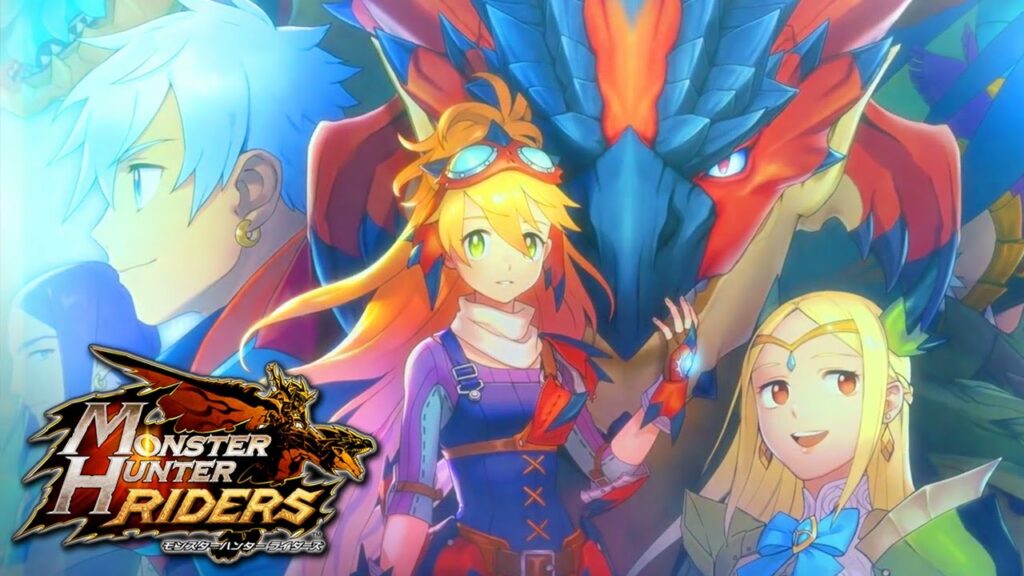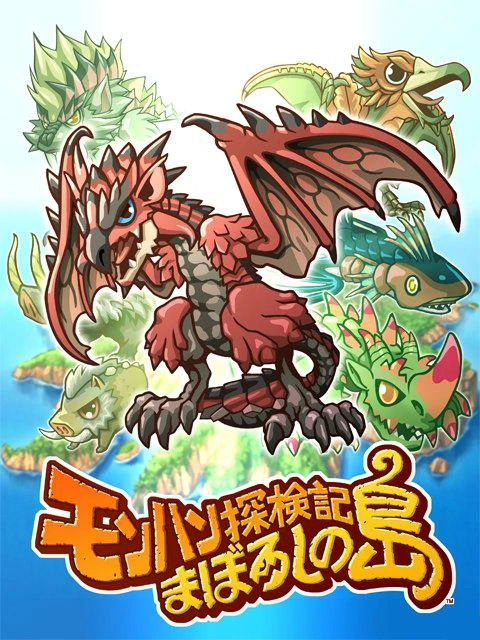As mobile games continue to be as popular as ever, there is without a doubt that Capcom would try to push its franchises like Monster Hunter and Mega Man into the mobile gaming space. As such it does not come as a surprise when Capcom revealed Monster Hunter Now, a new mobile title that would combine the hunting action the franchise is known for with augmented reality mechanics.
The game is produced in partnership with Niantic, the studio known for Pokémon GO, a title that sparked a social phenomenon back in 2016 where people held large gatherings outdoors to engage with the game.

However, some people may not know that this isn’t Monster Hunter’s first venture into the mobile gaming space as Capcom had previously released several titles. Unfortunately, many of the titles were either exclusive to Japan or have since been discontinued for various reasons, leaving them inaccessible and forgotten.
With Monster Hunter Now launching next week, let’s look back at the Monster Hunter mobile games that are not widely known worldwide or some that are no longer accessible.
Monster Hunter Explore

Let’s start the list with the more known Monster Hunter mobile game in the community, Monster Hunter Explore. The game was released in Japan on the 29th of September, 2015, and has gameplay closer to the action combat fans know for in Monster Hunter. In the game, players would tap and swipe to execute specific weapon moves against monsters, evade or guard at the right time, and so on.

What sets Monster Hunter Explore apart from other spin-off mobile titles is its content, featuring a weapon known as the Accel Axe exclusively in the game. The weapon is said to be designed specifically with the game’s faster-paced combat in mind, having a gas compression system to have players propel themselves around to deliver powerful blows to monsters.
Additionally, weapons in Monster Hunter Explore are said to possess wildly different special properties that alter certain moves. What’s more, Monster Hunter Explore also introduces a new element known as Earth for iconic monsters such as Diablos and Barroth.

Another thing that made Monster Hunter Explore special is its exclusive monsters, such as the Egyptian-themed Elder Dragons Nef-Garmat and Eo Garudia. Throughout its lifespan, the game also featured many collaborations with well-known anime series or games, altering existing monsters to look like characters from the collab. For example, Aberrant Deviljho is a Deviljho that was designed to look like the Colossal Titan from Attack on Titan. Other notable collaborations were Fullmetal Alchemist, Fate series, Fairy Tail, Evangelion, and more.
Aside from collaboration monsters, the game also fashioned its monsters during festive events like an Uragaan with skins like watermelon or Volvidon wearing Santa Claus clothing during Christmas. Monster Hunter Explore ends its services on November 27, 2020.
Monster Hunter Riders

Next on the list is the more recent mobile title, Monster Hunter Riders, Capcom’s attempt into the gacha RPG territory.
Released back on February 19th, 2020, in Japan, the game took inspiration from the other spin-off title, Monster Hunter Stories, from its visual style to the turn-based gameplay. As a gacha game, Monster Hunter Riders featured unlockable anime-style characters in either iconic monster armor or newly designed ones, locked behind a rarity system, with higher-tier riders possessing unique personalities, backstories, and abilities.

Monsters, like the riders, are also locked behind a rarity system and obtainable through spinning the gacha, but they can also be acquired through events that are similar to the egg-hunting gameplay of Monster Hunter Stories.
Additionally, the game featured a turn-based combat albeit a lot simpler compared to Monster Hunter Stories, removing the rock-paper-scissors style gameplay for the traditional elemental strength and weakness system. The game also had a bond system where character stats such as elemental defenses would change depending on the monsters they are paired with. Riders and monsters would also share the same hit points in combat so if one fell in combat, the other follows.
Despite the game’s name, the characters do not actually ride the monsters outside of certain special moves players perform. Unfortunately, Monster Hunter Riders ended its services on June 16th, 2022.
Monster Hunter Diary: Mobile Felyne Village

Monster Hunter Diary: Mobile Felyne Village is the next on the list of forgotten mobile games in the franchise. The game was published in partnership with Japanese mobile provider, DeNA, as a social networking game featuring the series’ iconic mascot, Felynes. It was based on the more heartwarming world of Monster Hunter Diary: Poka Poka Airou Village, a spin-off installment developed by the Dark Souls and Elden Ring developer FromSoftware.
The game was released in Japan on August 10, 2010, as a free-to-play game that only required registration with the application store Mobage-town. In the game, players socialize with each other, collecting items cooperatively, changing outfits for the Felynes, and building villages together.
After only 17 days after launch, Monster Hunter Diary: Mobile Felyne Village garnered over 500,000 users.
Monster Hunter Dynamic Hunting
Before Monster Hunter Explore, there was Dynamic Hunting, which was released worldwide on the 1st of June, 2011 on iOS devices. Much like Explore, Monster Hunter Dynamic Hunting attempted to bring the franchise’s action combat onto the touchscreen, utilizing gesture controls.
The game shared many mechanics with its successor, Monster Hunter Explore, albeit less refined. The game also featured a grading system that revealed the players’ performance in a quest, ranking them based on how well they evade attacks, the number of monster parts that are broken, how many faints are left, and the time remaining.
Multiplayer was also possible in the game through the use of Bluetooth, but only up to 2 players. Monster Hunter Dynamic Hunting was a paid title that cost $4.99 on iTunes but the game is now no longer available for download.
Monster Hunter: Phantom Island Voyage

Moving on, we have Monster Hunter: Phantom Island Voyage, a spin-off mobile game that sets itself apart from the others as instead of being based on the main series, the game was based on the now discontinued MMORPG Monster Hunter Frontier. As such, the game featured monsters not found in the main series such as Rukodiora, Kamu Orugaron, Berukyurosu, and many more.
Published by GREE, a mobile social network in Japan, the game was a social-based game that had players obtain and raise their own monsters on islands. Players would then pit them against other players’ monsters in battle.
In addition, players could also exchange items with other players or cooperate with each other to battle against much larger monsters. The game was released at the end of 2011, exclusively in Japan and players who pre-registered for the game were given a random rare monster for free. Other than that, not much information is known about the game.
Other Monster Hunter Mobile Games
Apart from the previously mentioned titles, Capcom has also released several other short-lived Monster Hunter mobile games. Many of them have minimal information widely available, which made it hard to pinpoint how those games performed during their release and what led them to be discontinued.
One such mobile game was Monster Hunter i, one of the earliest spin-off mobile titles of the series which was released in Japan on February 6, 2006, and like many of the other titles, tried to bring the action of combat of the series to mobile. Another is Monster Hunter Massive Hunting which was apparently released on February 4, 2013, for iOS devices in Japan with not much additional information.
Another notable one goes by the unofficial translated name of Monster Hunter Big Game Hunting Quest, which set itself apart from other mobile titles as a card battle RPG for iOS and Android devices. The game featured collectible cards with illustrations of the hunters in anime style which are used against the monsters. Monster Hunter Big Game Hunting Quest was released in Japan on October 29, 2013, and was discontinued on December 13, 2018.
These are some of the Monster Hunter mobile games that are widely forgotten by the community to ever exist, many of them brought interesting ideas to the franchise but never got out of their region exclusivity to shine.
The Future of Monster Hunter Mobile Games
Monster Hunter is a very popular franchise in Japan, but it wasn’t always the case until the series shot up in popularity with the release of Monster Hunter Freedom for the PSP back in 2005, bringing the games to handheld. Since then, the series remained popular in the country and has been expanded into various media and even having a themed amusement park in Universal Studios Japan. However, the series never had much success outside of Japan, thus many titles were either delayed for their global release or remained region-exclusive.
One factor many fans believe to have contributed to the popularity of the series in the country is Japan’s commuting lifestyle, which makes the citizens more reliant on portable devices thus handheld games are their go-to entertainment while traveling. As such it does not come as a surprise that many Japanese publishers would capitalize and extend popular IPs like Dragon Quest, Ni no Kuni, and Final Fantasy into mobile games, targeting primarily Japanese audiences.

However, the Monster Hunter series took a turn into global success when Capcom released Monster Hunter World globally for major home consoles in 2018. By December 2022, Monster Hunter World had reached 10 million sales and is one of Capcom’s most successful titles. As such, things may be different this time for the series as Monster Hunter Now will be launching globally, targeting the newer fans with a focus on bringing fan-favorite monsters from Monster Hunter World into mobile.
Who knows what future will unfold for the Monster Hunter series? Fans were not expecting to see Monster Hunter Frontier content back, but Capcom surprised them with Espinas returning in Monster Hunter Rise: Sunbreak. So perhaps elements from Monster Hunter Explore or Monster Hunter Riders could have a surprise return in Monster Hunter Now.





![[GUIDE] SD Gundam G Generation Eternal Unit Tier List](https://cdn.gamerbraves.com/2025/04/SD-Gundam-G-Generation-Eternal-Tier-List_Review_FI-360x180.jpg)


![[GUIDE] Clair Obscur: Expedition 33 Tier List – From Gustave to Verso: Who Deserves Your Party Slot?](https://cdn.gamerbraves.com/2025/04/Clari-Obscur-Expedition-33-Character-Tier-List_Guide_FI-360x180.jpg)



![[SEA Exclusive] From Shadows to Shipwrecks – Jennifer English Talks About Bringing Emotional Depth to Clair Obscur: Expedition 33](https://cdn.gamerbraves.com/2025/04/Clair-Obscur-Jennifer-English_Interview_FI-360x180.jpg)

![[EXCLUSIVE] Do the Game Interview – An Intimate Look at the Challenges of Game Development](https://cdn.gamerbraves.com/2025/04/Do-the-Game_Interview_FI-1-360x180.jpg)
![[EXCLUSIVE] Interview with the Minds Behind of Den of Wolves – 10 Chambers’ New Sci-Fi Heist FPS](https://cdn.gamerbraves.com/2025/04/Den-of-Wolves_Interview_FI-360x180.jpg)









![[GUIDE] Finding Alma’s Lost Glasses in The Apple of Her Eye Side Quest](https://cdn.gamerbraves.com/2025/04/Alma-Glasses-Quest_Gudie_FI-360x180.jpg)



![[GUIDE] Farming Nightflower Pollen in Monster Hunter Wilds](https://cdn.gamerbraves.com/2025/03/MHWilds-Pollen_Guide_FI-360x180.jpg)